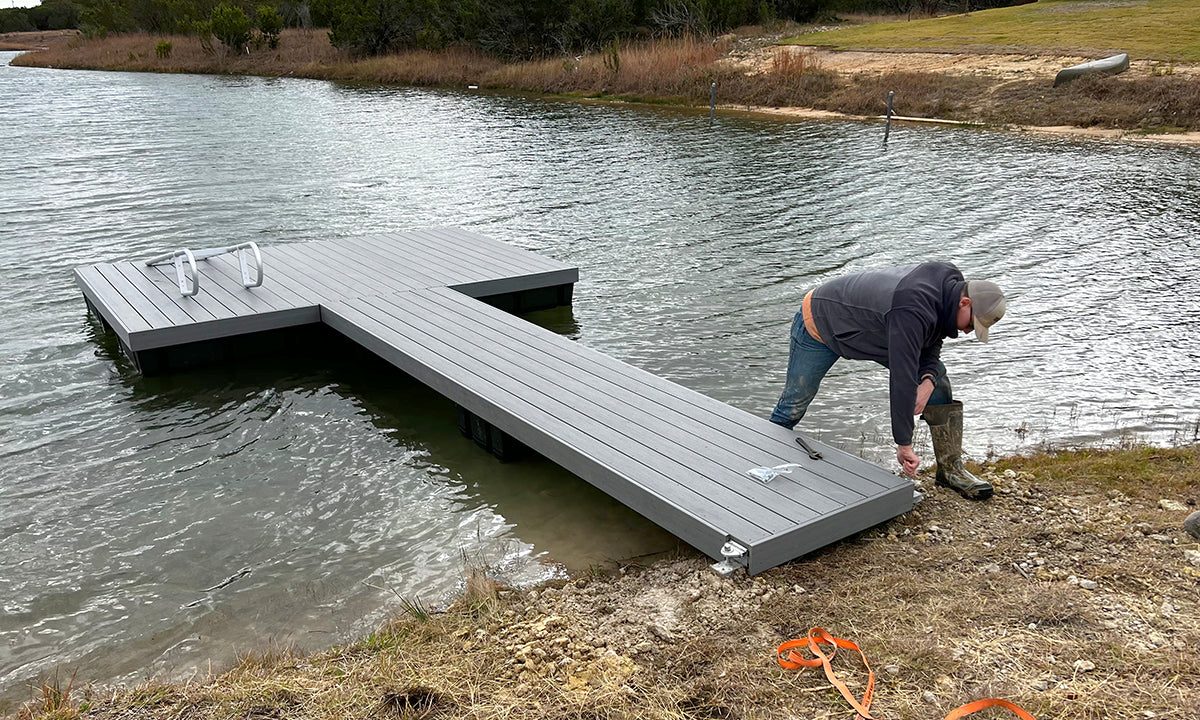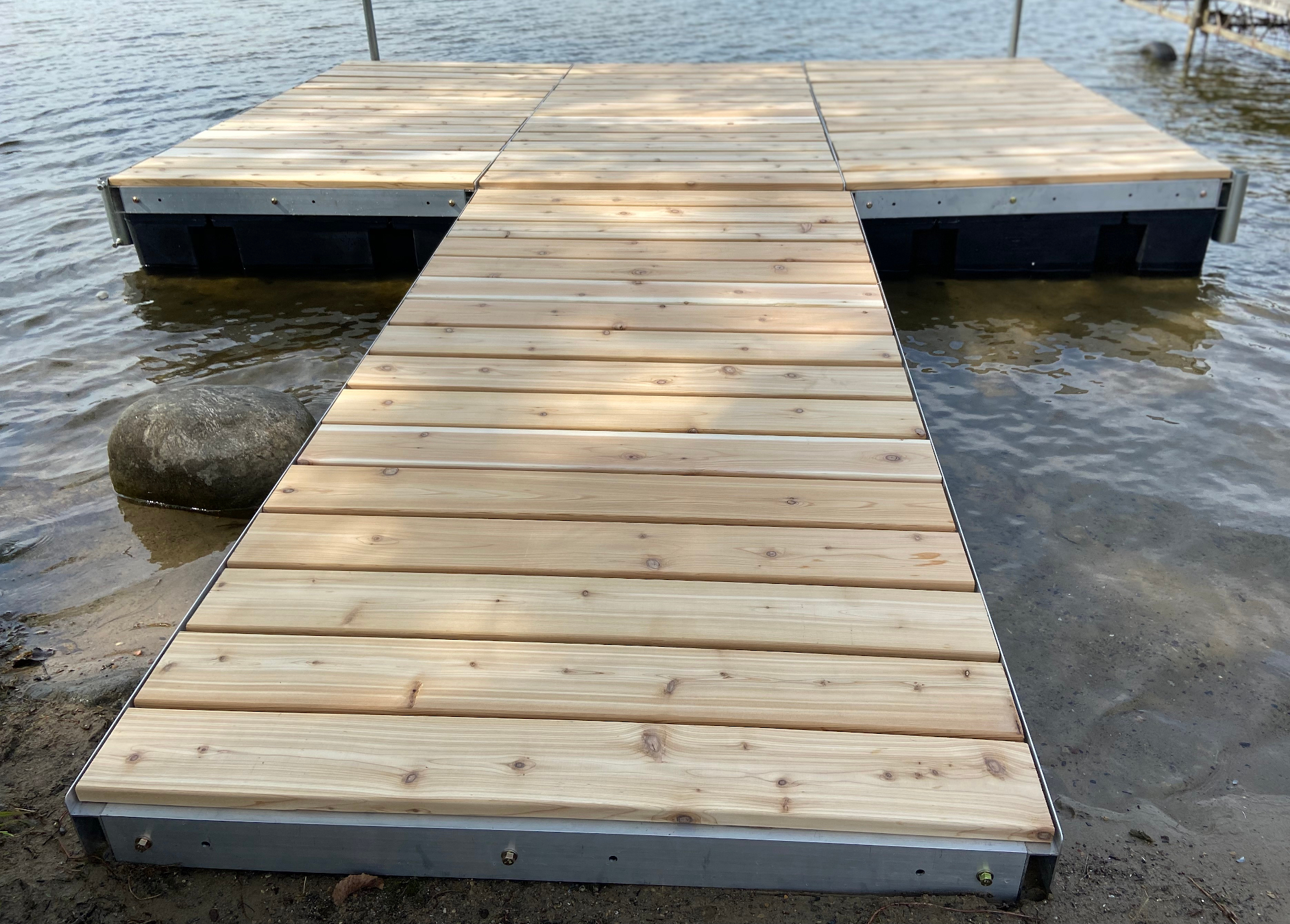Maximizing Your Outdoor Area with Specialized Floating Dock Services
Maximizing Your Outdoor Area with Specialized Floating Dock Services
Blog Article
Floating Docks: The Suitable Option for Versatile Water Accessibility
Floating docks present a compelling service for a variety of water gain access to requires, offering flexibility that goes beyond traditional mooring alternatives. Their ability to adapt to ever-changing water levels while ensuring security and safety and security makes them specifically useful for both leisure and commercial applications. The modular nature of floating docks promotes modification, catering to specific needs. The nuances of setup and maintenance, alongside the variety of applications, call for a closer examination to completely value their possible advantages and ramifications for river gain access to techniques.
Benefits of Floating Docks
Floating docks deal countless benefits that enhance water accessibility for various applications. Their capability to increase and drop with changing water levels makes them specifically beneficial in environments with varying trends or seasonal variants. This flexibility ensures that vessels can quickly tie without problem for the water's deepness, offering a trusted system for leisure, commercial, and industrial uses.
Furthermore, floating docks are often created from long lasting materials that stand up to rust, making them appropriate for long-term usage in aquatic environments. Their installation is generally less intrusive than conventional set docks, decreasing the environmental effect and facilitating quicker release (floating dock builder). This adaptability enables easier relocation or reconfiguration according to customer requirements or environmental changes
Safety is one more crucial advantage; floating docks can give secure gain access to for individuals disembarking or boarding from watercrafts and reduce the risk of accidents connected with unpredictable surface areas. Additionally, they can be developed to accommodate a selection of accessories, such as cleats and fenders, enhancing capability. Overall, floating docks represent an effective option for boosting water accessibility across diverse markets while advertising security and ecological sustainability.

Kinds of Floating Docks
Various sorts of floating docks deal with different requirements and environments, each created with certain features to optimize functionality. The most usual types consist of modular docks, which contain interlocking sections that enable easy customization and growth. These docks are optimal for recreational use, as they can be customized to fit various watercraft sizes and water conditions.
One more preferred alternative is the fixed floating dock, which continues to be anchored in place yet drifts with changing water levels. floating dock services. This type is particularly fit for areas with very little tidal fluctuations, giving stable accessibility for fishing or swimming. In addition, there are drive-on docks, which include a sloped style that permits boats to quickly drive on and off, making them appropriate for personal watercraft and smaller vessels
For commercial applications, sturdy floating docks are offered, created from reinforced materials to withstand considerable lots and extreme aquatic environments. Green floating docks make use of sustainable products and layouts to lessen ecological influence, typically incorporating attributes like plant life to support regional wildlife. Recognizing the different types of floating docks makes sure that customers can pick the most proper remedy for their certain needs.
Setup Process Review
An effective setup of floating docks calls for mindful planning and focus to information to guarantee optimum performance and safety. The initial action includes examining the website problems, including water deepness, current, and prospective challenges. This analysis informs the choice of the proper dock materials and layout tailored to the particular setting.
Following, acquiring essential permits is critical, as lots of territories have laws relating to building on water bodies. When authorizations are protected, the setup can proceed. Begin by preparing the structure, which might involve anchoring systems or pilings tailored to the dock kind and local conditions.
Adhering to the structure configuration, assemble the dock areas according to supplier requirements. Make sure that all parts are firmly attached and lined up to endure environmental stresses. Setting the dock in the designated location, guaranteeing it is degree and stable.

Maintenance Tips and Finest Practices
After the installment process is total, ongoing maintenance plays a vital duty in ensuring the durability and capability of floating docks. Regular inspections must be conducted to determine any indicators of wear, damages, or degeneration - floating dock builder. Look for any type of loose installations, cracks, or splitting up in the dock sections, as these can endanger structural stability
Cleaning up the dock is important to get rid of particles, algae, and other accumulation that can influence its look and safety. Utilize a gentle stress wash occasionally to keep cleanliness without causing damages to the surface area. In addition, applying a safety sealant every couple of years can aid enhance longevity and withstand environmental wear.
Take notice of the mooring lines and anchors, guaranteeing they are safe and complimentary from deterioration. Replace any type of abject components immediately to stay clear of risks. Seasonal modifications may also be needed; during severe weather condition problems, strengthening the dock or repositioning can stop damage.
Applications for Floating Docks
Floating docks serve a wide range of applications, accommodating both leisure and commercial requirements. In recreational settings, they give smooth useful link access to sites rivers for activities such as boating, angling, and swimming. Their adjustable nature enables installation in varying water levels, guaranteeing risk-free and secure accessibility no matter tidal fluctuations.
Readily, floating docks are important for marinas and waterside companies. They assist in the docking of vessels, enabling efficient dumping and packing of items. Their modular design enables very easy expansion or reconfiguration to suit altering company needs, making them ideal for watercraft leasings, scenic tour operations, or angling charters.
Additionally, floating docks are used in ecological applications such as aquatic research study and habitat remediation. They can work as platforms for clinical researches, keeping an eye on water high quality, or carrying out wild animals surveys without troubling sensitive communities.
In industrial contexts, floating docks are used in building and construction tasks, providing accessibility to hard-to-reach areas for tools and personnel. Their adaptability, longevity, and minimal impact on the atmosphere make them an optimum option for a large variety of applications, improving both functionality and access in numerous water-based environments.
Conclusion
In final thought, floating docks represent an ideal solution for diverse water access requires, owing to their flexibility, longevity, and modular style. Floating docks offer as an important asset for recreational, industrial, and environmental projects, guaranteeing trusted access to rivers and promoting lasting techniques in water settings.
Floating docks present a compelling service for a range of water access needs, offering versatility that goes view publisher site beyond standard mooring choices.Floating docks deal many advantages that enhance water access for different applications. In general, floating docks represent a reliable solution for improving water access throughout diverse fields while promoting safety and security and environmental sustainability.
One more prominent choice is the fixed floating dock, which continues to be anchored in place however drifts with changing water degrees.In final thought, floating docks stand for an ideal option for varied water gain access to needs, owing to their versatility, longevity, and modular style.
Report this page